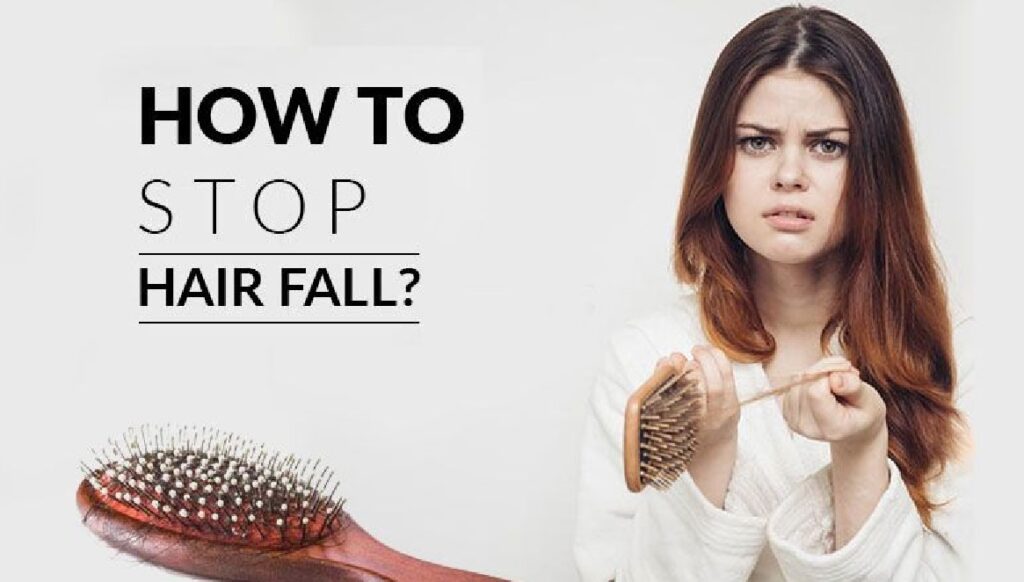Depending on the reason for your hair loss, certain techniques may assist in naturally regrowing hair. These might involve scalp massages and the application of substances such as aloe vera or essential oils such as coconut and lemon oil.
Most individuals have experimented with a homemade solution for hair loss, whether for themselves or their loved ones. However, skepticism often surrounds natural or home-based treatments for hair loss. Therefore, we’ve compiled a selection of the most effective home remedies for hair loss that you can readily try at home. Hereby, presenting the Effective 10 Natural Home Remedies to Stop Hair Fall.
Hair loss can stem from various factors like genetics, hormonal shifts, diet, and lifestyle. While home remedies may not completely solve severe hair loss, they can promote healthier hair and mitigate hair fall to some degree.
This article will explore different home remedies for you to explore.
1: Scalp Massage
Applying hair oils and masks while massaging the scalp can stimulate it, potentially enhancing hair thickness.
The stretching motion during massage might promote hair growth and thickness by targeting the dermal papilla cells situated at the base of hair follicles. These cells are pivotal in the hair’s regeneration and growth cycle.
According to a 2019 study, scalp massage has been shown to enhance hair growth, blood circulation, and scalp condition in individuals. Additionally, scalp massage can alleviate stress and tension, both of which are associated with hair loss.
When massaging your scalp, use your fingertips instead of your fingernails. Employ gentle circular motions across the scalp, applying light to moderate pressure. While there’s no set duration for a scalp massage, the aforementioned study administered daily massages for 4 minutes each session over a span of 24 weeks.
2: Aloe Vera
Aloe vera is believed to aid in addressing hair loss, supported by anecdotal evidence indicating its potential benefits, including:
- Calming the scalp
- Nourishing the hair
- Alleviating dandruff
- Clearing hair follicles
Nevertheless, a 2022 review notes the scarcity of comprehensive human studies, with primarily limited evidence from animal research. Further investigation involving human subjects is warranted.
To integrate aloe vera into your hair care routine, consider applying pure aloe vera gel directly to your scalp several times a week. Alternatively, opt for shampoos and conditioners infused with aloe vera for added benefits.
3: Coconut Oil
Containing fatty acids, particularly lauric acid, coconut oil has the ability to penetrate the hair shaft and minimize protein loss from the hair.
Additionally, a study conducted in 2021 suggests that applying coconut oil to the scalp may enhance the scalp’s microbiome, thereby promoting healthier scalp and hair follicles.
Depending on your hair type, coconut oil can be utilized before or after shampooing. For individuals with oily hair, it can be applied as a leave-in treatment overnight or for a few hours prior to washing.
Massage the coconut oil thoroughly into your scalp and throughout your hair. For those with dry hair, coconut oil can also serve as an effective leave-in treatment.
4: Viviscal
Viviscal is a natural dietary supplement designed to potentially stimulate hair growth in individuals experiencing hair thinning.
Its formula comprises a blend of mineral-rich components, including:
- Shark and mollusk powder
- Organic silica
- Vitamin C (sourced from acerola cherry)
- Biotin
- Zinc
These ingredients are believed to facilitate cell regeneration and fortify existing cells.
For optimal results, it is recommended to take the pills twice daily for a minimum of 6 months. Additionally, Viviscal offers a complementary shampoo and conditioner to complement the supplement regimen.
5: Fish Oil
Supplements containing fish oil are rich in nutrients, including proteins and omega fatty acids.
According to a study conducted in 2015, incorporating an omega supplement alongside antioxidants contributed to enhancing hair density, diameter, and addressing hair loss.
Omega-3 fatty acids have also been associated with reducing inflammation and enhancing immunity, potentially supporting the hair growth cycle and overall well-being.
Prior to incorporating supplements into your diet, it is advisable to consult with a healthcare professional and adhere to the recommended dosage provided by the manufacturer.
6: Ginseng
Ginseng has been explored for its potential benefits in addressing hair loss. It’s believed that ginseng supplements may help promote hair growth by stimulating hair follicles. The active components in ginseng, known as ginsenosides, are thought to play a role in this process. However, it’s essential to consult with a healthcare professional before incorporating ginseng or any supplement into your regimen, as individual responses can vary, and it’s important to ensure it’s safe and suitable for your specific needs.
The consumption of ginseng supplements is believed to stimulate hair follicles, potentially promoting hair growth, as per trusted sources. Ginsenosides, the active constituents of ginseng, are attributed to its beneficial impact on hair.
It is important to adhere to the recommended dosage and instructions when taking supplements and to be vigilant for any potential side effects.
7: Onion Juice
Despite its pungent odor, the potential benefits of onion juice may make it worthwhile for some individuals.
A study conducted in 2014 revealed that onion juice could potentially promote hair growth and serve as a treatment for patchy alopecia areata, an autoimmune condition characterized by hair loss in localized areas due to the body’s immune system attacking the hair follicles.
Additionally, onion juice is believed to enhance circulation. Research conducted with animals in 2015 demonstrated an increase in keratinocyte growth factor, a crucial factor in the development and growth of hair follicles.
To utilize onion juice, blend a few onions and extract the juice. Apply the juice to your scalp and hair, allowing it to sit for at least 15 minutes before rinsing with shampoo.
8: Rosemary Oil
As per a review published in 2020, rosemary oil is suggested to potentially stimulate the growth of new hair and prevent hair loss.
Moreover, a study conducted in 2015 indicated that rosemary oil could be comparable in effectiveness to minoxidil for treating androgenetic alopecia.
To incorporate rosemary oil into your hair care routine, mix a few drops of it with a carrier oil such as argan or jojoba oil, and gently massage the mixture into your scalp and hair before rinsing. This can be done several times a week.
Alternatively, you can add a few drops of rosemary oil to your daily shampoo and conditioner. However, it’s important to avoid direct application of essential oils to the skin and always dilute them in a carrier oil or shampoo.
9: Geranium oil
Geranium, scientifically known as Pelargonium graveolens, is an aromatic plant indigenous to South Africa. Geranium oil is the concentrated essence derived from its leaves.
According to a study conducted in 2017 involving animals, geranium oil was observed to enhance hair growth and improve circulation in mice.
Geranium oil is another essential oil that is sometimes used for addressing hair loss. Although research specifically on geranium oil for hair fall is limited, it is believed to have potential benefits for scalp health and hair growth due to its anti-inflammatory and antimicrobial properties.
To use geranium oil for hair fall, you can mix a few drops of it with a carrier oil like coconut or jojoba oil and massage it into your scalp. Leave it on for a few hours or overnight before washing it out with shampoo. Alternatively, you can add a few drops of geranium oil to your shampoo or conditioner and use it regularly.
As with any essential oil, it’s essential to perform a patch test before using geranium oil to ensure you don’t have an allergic reaction. Additionally, consult with a healthcare professional before incorporating it into your hair care routine, especially if you have any underlying medical conditions or are pregnant or breastfeeding.
10: Lemon Oil
In a study involving animals conducted in 2016, it was discovered that lemon oil could potentially support scalp health and stimulate hair growth. Likewise, a review from 2021 indicates that sinapic acid, a bioactive compound found in lemons, may contribute to promoting hair growth.
To utilize lemon for hair care, apply fresh lemon juice to your scalp and hair approximately 15 minutes before shampooing. Alternatively, you can incorporate diluted lemon essential oil into a carrier oil to create a hair mask
Lemon oil is often used in hair care for its potential benefits in promoting scalp health and reducing hair fall. It is believed to possess antimicrobial and astringent properties that can help maintain a clean and healthy scalp, which is essential for optimal hair growth.
To use lemon oil for hair fall, you can mix a few drops of it with a carrier oil like coconut or olive oil and massage it into your scalp. Leave it on for a few hours or overnight before washing it out with shampoo. Lemon oil can also be added to your shampoo or conditioner for regular use.
However, it’s important to note that lemon oil is highly concentrated and can cause skin irritation or sensitivity in some individuals, especially if applied directly to the scalp. Therefore, it’s essential to perform a patch test before using lemon oil and to dilute it properly with a carrier oil. Additionally, avoid exposing your hair or scalp to direct sunlight after applying lemon oil, as it can increase the risk of sunburn. As always, consult with a healthcare professional before incorporating new products into your hair care routine, especially if you have any underlying medical conditions.
When to Consult a Doctor Regarding Hair Loss
It’s essential to consult with a healthcare professional if you notice excessive hair loss, particularly when accompanied by other symptoms like fatigue, anxiety, itching, or mood changes.
Depending on the root cause of the hair loss, your healthcare provider may recommend specialized products to address the issue. These treatment options may involve shampoos, supplements, or prescription medications. In certain situations, hair transplantation procedures such as follicular unit transplant and follicular unit extraction may be suggested.
Frequently asked questions regarding natural hair regrowth
What leads to hair loss?
Hair loss can stem from various factors, including:
- Genetic predisposition
- Autoimmune disorders
- Stress
- Hormonal fluctuations
- Thyroid abnormalities
- Recent surgical procedures
- Illness
- Damage from hair treatments like bleaching and dyeing
- Scalp conditions
- Trichotillomania (hair pulling disorder)
- Tight hairstyles
- Deficiencies in vitamins
How can I prevent hair loss?
To minimize hair loss:
- Maintain a nutritious diet rich in calories, protein, and iron.
- Employ stress management techniques.
- Address thyroid disorders or other medical issues contributing to hair loss.
- Refrain from hairstyles that exert excessive tension on the hair.
- Consider using a cooling cap during chemotherapy treatment.
Does applying oil prevent hair loss?
While oils can nourish your hair, they do not directly stimulate hair growth. Therefore, if you believe that hair oils can halt hair loss and encourage hair growth, this is incorrect. Whether it’s coconut oil, almond oil, or onion oil, all oils primarily function as effective conditioners. They nourish the hair shaft and help alleviate frizziness or dryness.
Does onion juice promote hair regrowth?
Numerous individuals have claimed that it enhances hair thickness, stimulates growth, and even fosters new growth in cases of hair loss. However, it’s important to note that onion juice is not a remedy for pattern baldness, alopecia, or other hair loss-related conditions.
Conclusion
Certain natural remedies can potentially facilitate fast and healthy hair regrowth. Nevertheless, it’s crucial to bear in mind that these treatments might require several months before any significant changes become evident. Feel free to experiment with different remedies and combinations to find what works best for you.
If these natural approaches prove ineffective, consult with a healthcare professional regarding medications or procedures as alternative options.







Абсолютно стильные новинки модного мира.
Абсолютно все новости всемирных подуимов.
Модные дома, лейблы, высокая мода.
Интересное место для стильныех хайпбистов.
https://ulmoda.ru/
Полностью актуальные новинки мировых подиумов.
Актуальные события лучших подуимов.
Модные дома, лейблы, высокая мода.
Приятное место для модных хайпбистов.
https://paris.luxepodium.com/
Очень трендовые новинки модного мира.
Важные новости известнейших подуимов.
Модные дома, бренды, высокая мода.
Самое приятное место для стильныех людей.
https://luxury.superpodium.com/
Fashion, luxe, lifestyle
The best style site for hypebeasts and cute people.
Fashion news, events. Best collections, collaborations, drops.
https://watch.lepodium.net/
Fashion, luxe, travel
Best fashion startpage for hypebeasts and cute people.
Fashion news, events. Latest collections, collaborations, drops.
https://dubai.luxepodium.com/
Fashion, luxury, travel
Good fashion startpage for hypebeasts and cute people.
Industry news, events. Best collections, collaborations, limited editions.
https://london.luxepodium.com/
Абсолютно актуальные события мира fashion.
Абсолютно все мероприятия самых влиятельных подуимов.
Модные дома, лейблы, высокая мода.
Самое лучшее место для трендовых хайпбистов.
https://richlifestyle.ru/
Style, luxe, travel
Perfect style portal for hypebeasts and cute people.
Podium news, events. Last collections, collaborations, limited editions.
https://lepodium.in/
Все свежие новости часового мира – трендовые новинки именитых часовых домов.
Точно все варианты часов от недорогих до экстра роскошных.
https://podium24.ru/
Абсолютно актуальные новости подиума.
Исчерпывающие эвенты самых влиятельных подуимов.
Модные дома, лейблы, высокая мода.
Свежее место для стильныех людей.
https://furluxury.ru/
Наиболее важные события мира fashion.
Все новости мировых подуимов.
Модные дома, торговые марки, высокая мода.
Интересное место для модных хайпбистов.
https://fe-style.ru/
Точно стильные события мира fashion.
Важные мероприятия лучших подуимов.
Модные дома, торговые марки, haute couture.
Интересное место для модных людей.
https://balenciager.ru/
Несомненно стильные новости мировых подиумов.
Все эвенты всемирных подуимов.
Модные дома, лейблы, гедонизм.
Лучшее место для стильныех людей.
https://outstreet.ru/
Избранные свежие события мира часов – последние модели лучших часовых домов.
Абсолютно все варианты хронографов от недорогих до супер люксовых.
https://bitwatch.ru/
Очень важные новинки мира fashion.
Абсолютно все события самых влиятельных подуимов.
Модные дома, торговые марки, haute couture.
Свежее место для стильныех людей.
https://luxe-moda.ru/
LeCoupon: трендовые новости для любителей fashion шоппинга
Новости, события, стильные образы, эвенты, дропы, подиум.
https://qrmoda.ru/
LeCoupon: трендовые события для любителей вещевого шоппинга
Новости, события, стильные образы, эвенты, дропы, подиум.
https://qrmoda.ru/
Самые трендовые новинки подиума.
Все новости известнейших подуимов.
Модные дома, бренды, гедонизм.
Свежее место для модных людей.
https://egomoda.ru/
Полностью важные новинки мировых подиумов.
Все эвенты самых влиятельных подуимов.
Модные дома, бренды, гедонизм.
Самое лучшее место для трендовых людей.
https://fashion5.ru/
Абсолютно важные новости мира fashion.
Исчерпывающие эвенты лучших подуимов.
Модные дома, лейблы, высокая мода.
Свежее место для модных хайпбистов.
https://rfsneakers.ru
Абсолютно свежие события подиума.
Все мероприятия мировых подуимов.
Модные дома, бренды, гедонизм.
Самое приятное место для стильныех людей.
https://whitesneaker.ru/
Полностью актуальные новости мира fashion.
Абсолютно все новости лучших подуимов.
Модные дома, торговые марки, haute couture.
Свежее место для трендовых хайпбистов.
https://modavmode.ru
Очень трендовые новости модного мира.
Исчерпывающие события лучших подуимов.
Модные дома, бренды, haute couture.
Свежее место для трендовых хайпбистов.
https://urban-moda.ru/
Точно свежие события моды.
Исчерпывающие события всемирных подуимов.
Модные дома, бренды, haute couture.
Самое лучшее место для модных хайпбистов.
https://miramoda.ru
Наиболее актуальные новости подиума.
Абсолютно все события всемирных подуимов.
Модные дома, торговые марки, высокая мода.
Интересное место для стильныех хайпбистов.
https://sofiamoda.ru
Точно свежие новинки мира fashion.
Исчерпывающие мероприятия мировых подуимов.
Модные дома, торговые марки, гедонизм.
Лучшее место для стильныех хайпбистов.
https://worldsfashion.ru/
Очень свежие события индустрии.
Важные новости самых влиятельных подуимов.
Модные дома, бренды, haute couture.
Лучшее место для трендовых хайпбистов.
https://fashionsecret.ru
hey there and thank you for your information – I’ve certainly
picked up anything new from right here. I did however expertise several technical points
using this site, since I experienced to reload the site many times previous to I
could get it to load correctly. I had been wondering if your hosting is OK?
Not that I’m complaining, but slow loading instances times will often affect your placement
in google and could damage your quality score if ads and marketing with Adwords.
Anyway I am adding this RSS to my e-mail and can look
out for a lot more of your respective exciting content.
Make sure you update this again very soon..
Escape room lista
Rattling superb information can be found on site.!
An impressive share! I have just forwarded this onto a co-worker who had been conducting a little research on this. And he in fact bought me breakfast because I stumbled upon it for him… lol. So let me reword this…. Thanks for the meal!! But yeah, thanx for spending some time to discuss this matter here on your internet site.